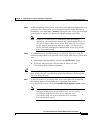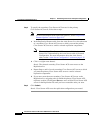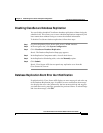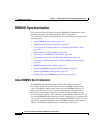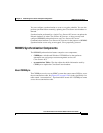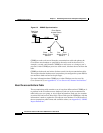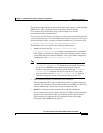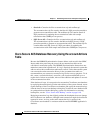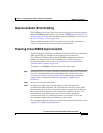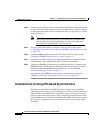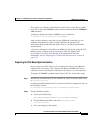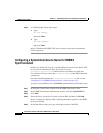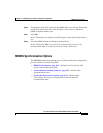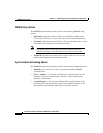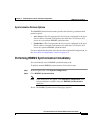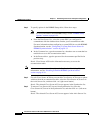
8-29
Cisco Secure ACS 3.0 for Windows 2000/NT Servers User Guide
78-13751-01, Version 3.0
Chapter 8 Establishing Cisco Secure ACS System Configuration
RDBMS Synchronization
Reports and Event (Error) Handling
The CSDBSync service provides event and error logging. For more information
about the RDBMS Synchronization log, see the “RDBMS Synchronization Log”
section on page 9-16. For more information about the CSDBSync service log, see
the “Service Logs” section on page 9-34.
During manual synchronizations, Cisco Secure ACS provides visual alerts to
notify you of problems that occurred during synchronization.
Preparing to Use RDBMS Synchronization
Synchronizing the CiscoSecure user database using data from the accountActions
table requires that you complete several significant steps external to
Cisco Secure ACS before configuring the RDBMS Synchronization feature
within Cisco Secure ACS. If you are planning to use a CSV file as your
accountActions table, also see the “Considerations for Using CSV-Based
Synchronization” section on page 8-30.
To prepare to use RDBMS Synchronization, follow these steps:
Step 1 Determine where you want to create the accountActions table and in what format.
For more information about the accountActions table, see the “About the
accountActions Table” section on page 8-26. For details on the format and
content of the accountActions table, see Appendix G, “ODBC Import
Definitions.”
Step 2 Create your accountActions table.
Step 3 Configure your third-party system to generate records and update the
accountActions table with them. This will most likely involve creating stored
procedures that write to the accountActions table at a triggered event; however,
the mechanism for maintaining your accountActions table is unique to your
implementation. If the third-party system you are using to update the
accountActions table is a commercial product, for assistance, refer to the
documentation supplied by your third-party system vendor.
For information about the format and content of the accountActions table, see the
Appendix G, “ODBC Import Definitions.”



